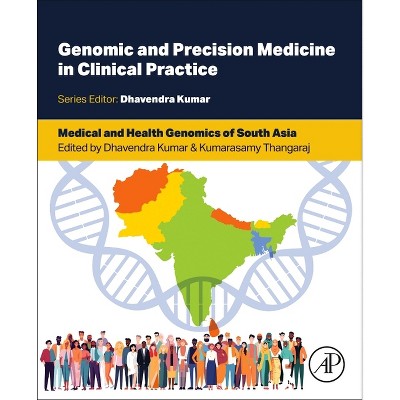Sponsored

Population Genomics in the Developing World - (Translational and Applied Genomics) by Marlo Möller & Caitlin Uren & George P Patrinos (Paperback)
In Stock
Sponsored
About this item
Highlights
- Population Genomics in the Developing World: Concepts, Applications, and Challenges, a new volume in the Translational and Applied Genomics series, provides a comprehensive, up-to-date summary of the field of population genomics in developing countries.
- Author(s): Marlo Möller & Caitlin Uren & George P Patrinos
- 224 Pages
- Science, Life Sciences
- Series Name: Translational and Applied Genomics
Description
Book Synopsis
Population Genomics in the Developing World: Concepts, Applications, and Challenges, a new volume in the Translational and Applied Genomics series, provides a comprehensive, up-to-date summary of the field of population genomics in developing countries. This book equips students, researchers, and clinicians with the practical skills and approaches necessary to face the unique challenges and opportunities of practicing population genomics in developing countries. Following a brief foundational overview, more than a dozen authors working in developing nations share applied case studies from the field, including rationale, methods, analysis, and outcomes to reinforce understanding. Key themes across the country-specific chapters include efficient genetic data generation and effective computational and statistical tools to analyze population-level data. This book then discusses clinical interpretation of these data, from direct-to-consumer ancestry testing to translational and applied precision medicine. A final chapter considers the ethical aspects of conducting genomic research in developing countries.
Review Quotes
"...addresses that topic head-on, delving into strategies, methods and results of population genomic studies in the developing world. [Its] purpose is to introduce researchers and clinicians to population genomics in the developing world. Through discussions of the current state of the field and outlining the skills and approaches necessary for these studies, the book aims to illustrate the challenges and opportunities of population studies in developing countries. In addition, it seeks to address the need for a broader perspective in population genomics.... [It] is extraordinarily successful in providing the information and practical knowledge needed for work by the intended audience in the developing world, ... benefits from clear writing and from the practical experience of the authors in the matters they discuss.... an excellent place for those interested in this aspect of the field to get their start, recommend[ed] to those interested in a more complete understanding of the origins, evolution, and composition of the human genome." (c)Doody's Review Service, 2025, Mark Sanders, PhD (UC Davis College of Biological Sciences)
Shipping details
Return details
Trending Non-Fiction











